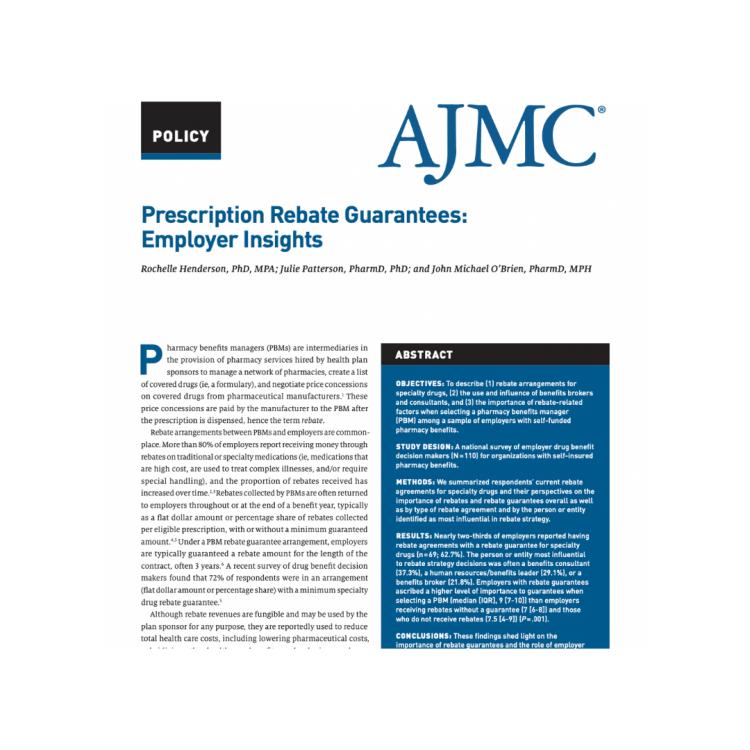AUTHORS
Rochelle Henderson, PhD, MPA; Julie Patterson, PharmD, PhD; John M. O'Brien, PharmD, MPH
PUBLICATION
The American Journal of Managed Care
TAKEAWAY POINTS
This study sheds light on employers’ perspectives of rebate guarantees, dependency upon rebate dollars, and the role that pharmaceutical rebates or employer benefits consultants play in their pharmacy benefits manager (PBM) selection.
- The common occurrence of rebate guarantees in the study sample raises concern given that rebate guarantees may obscure employer visibility into the actual net prices of drugs, resulting in formulary inclusion of higher-cost products and higher overall total pharmacy costs.
- Employers should consider the role of employer benefits consultants in presenting drug contracting options and, ultimately, PBM selection.
- It is important to keep the employer perspective in mind when considering reforms to the current rebate-centric incentives of pharmacy benefit management.
OBJECTIVES
Among a sample of employers with self-funded pharmacy benefits, to describe:
- rebate arrangements for specialty drugs,
- the use and influence of benefits brokers and consultants, and
- the importance of rebate-related factors when selecting a pharmacy benefits manager.
STUDY DESIGN
A national survey of employer drug benefit decision makers (N = 110) for organizations with self-insured pharmacy benefits.
METHODS
We summarized respondents’ current rebate agreements for specialty drugs and their perspectives on the importance of rebates and rebate guarantees overall as well as by type of rebate agreement and by the person or entity identified as most influential in rebate strategy.
RESULTS
Nearly two-thirds of employers reported having rebate agreements with a rebate guarantee for specialty drugs (n = 69; 62.7%). The person or entity most influential in rebate strategy decisions was often a benefits consultant (37.3%), a human resources/benefits leader (29.1%), or a benefits broker (21.8%). Employers with rebate guarantees ascribed a higher level of importance to guarantees when selecting a PBM (median [IQR], 9 [7-10]) than employers receiving rebates without a guarantee (7 [6-8]) and those who do not receive rebates (7.5 [4-9]) (P = .001).
CONCLUSIONS
These findings shed light on the importance of rebate guarantees and the role of employer benefits consultants and brokers in PBM selection. As the public discourse on PBMs and drug rebates continues, it is important to recognize the role employer benefits consultants may play in perpetuating employer reliance on guaranteed rebate arrangements.
